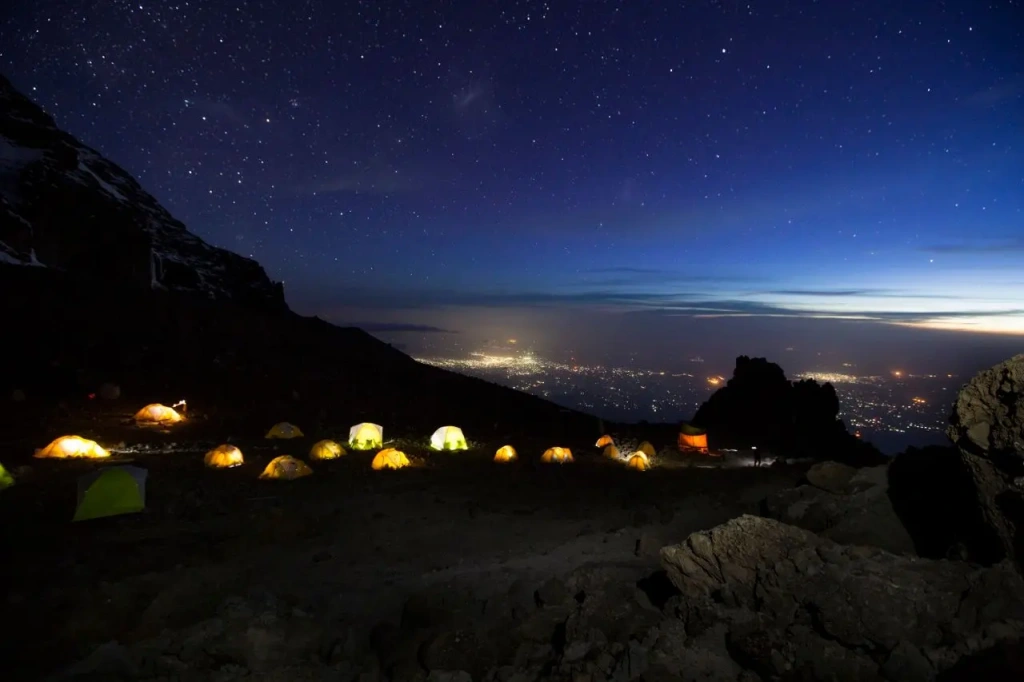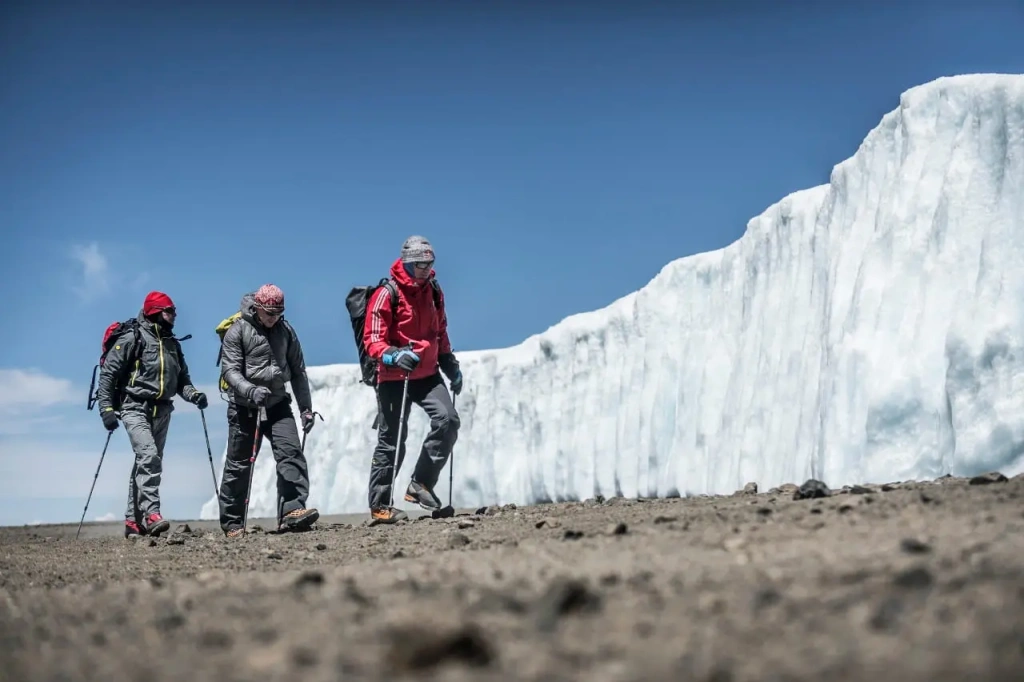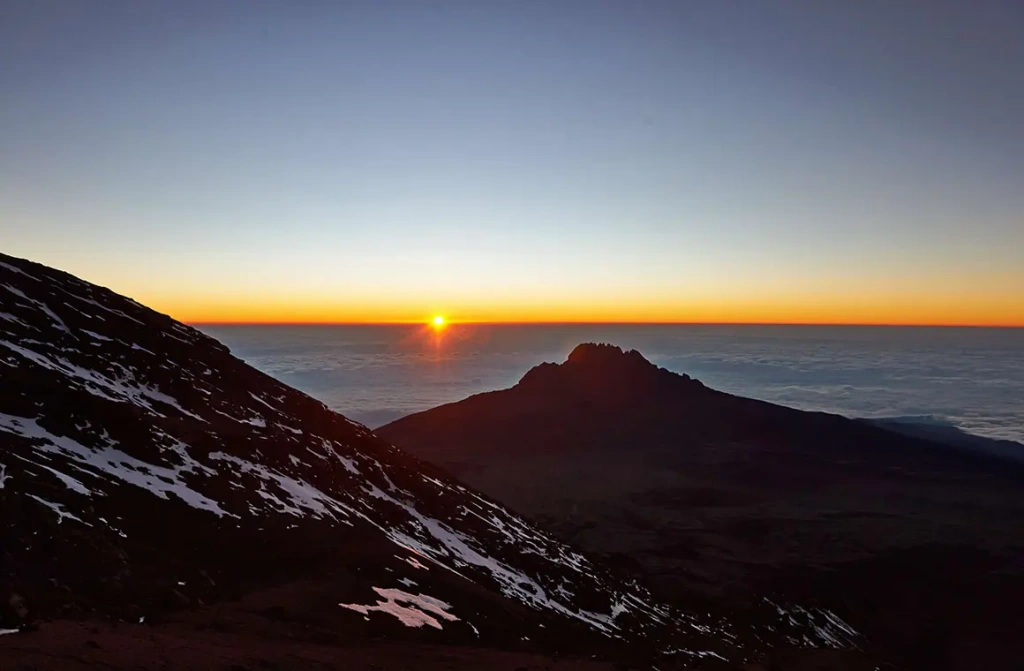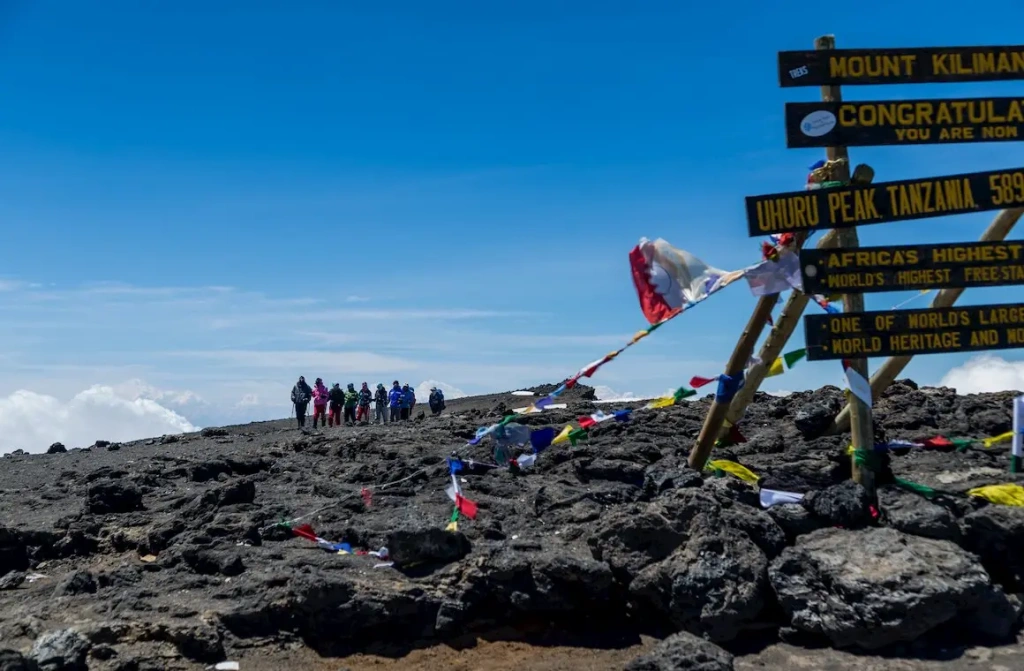Kilimanjaro Climbing Cost: Comprehensive Insights by Altezza Travel
How much does it cost to climb Kilimanjaro? What factors affect climbing prices?
Many different factors affect the climbing prices. A Kilimanjaro climb can cost from $1,400 (standard) to over $7,000 (luxury package) and above. Blend this knowledge with the fact that there are 250 licensed and hundreds of unlicensed operators in the region and making the right choice becomes a major task. In fact, to understand how the climbing Mt. Kilimanjaro cost is formed many different factors should be taken into consideration.
The Variety of Offers and Cost Information for Climbing Kilimanjaro
The price quoted for a package may often serve as a hint as to what your future climbing experience will be like. Yet, basing your decision only on cost would be a mistake. In fact, Mt Kilimanjaro climbing cost has many hidden, yet essential components.
With personal safety and a lifetime of memories at stake, choosing the cheapest way to climb Kilimanjaro is never a good idea. As a rule, a safe and comfortable Mt. Kilimanjaro hike costs not less than $1,400.
On the other hand, one does not necessarily need to pay the $7,000 + for a VIP package to get that extra service that may make all the difference in the world.
In this article we shall spell out how Kilimanjaro climb cost is formed, and how to choose the best offer to fit your budget. The following example is based on a Machame route 7-day "Classic" package for 2 or more climbers. This is by far the most popular option that offers a reasonable (neither a budget deal nor an extravagant affair with hundreds of porters) level of comfort at a reasonable price.
Climbing Kilimanjaro: Price Components
The price of a Kilimanjaro climb is made up of two kinds of costs: fixed, (i.e. park fees per person), and variable, i.e. (transfers and equipment), which are shared between all members of the group and, up to a certain point, lower as the number of climbers grows.
Unless you take the risk of opting for the lowest of offers, slighting most if not all of safety and comfort features that are normally available, the final price of your trek shall include the costs of the following:
Kilimanjaro National Park Fees
Every Mount Kilimanjaro climber is required to pay park fees, which inholds conservation, camping, rescue and crew fees. On Lemosho and Rongai routes special forest fees are also applicable. It is another key element of Mt Kilimanjaro climb cost.
Total Park Fees, depending on route and number of days, will amount to between US$800 and 1,100 (all calculations and prices henceforth are given in USD).
Never trust claims that it is possible to climb Mt. Kilimanjaro and avoid fees by bypassing ranger posts. It is simply impossible to reach Uhuru Peak avoiding any encounters with park rangers. Dozens of those who attempt this are caught every year.
On the other hand, many budget operators keep their rates low by relying on high unemployment rates which allow them to staff their crews with those willing to work hard with no guaranteed pay. Bypassing established official Mount Kilimanjaro routes where climbing permits are checked at each ranger post will bereave you of the possibility of receiving timely assistance from the rangers should such a necessity arise.
Lastly, it is unlawful. Trespassing on National Parks is considered a serious offence in Tanzania. The best-case scenario entails being bereft of the chance of ever experiencing the wonders of Tanzania again after being deported and stiff fines. The worst-case scenario would involve imprisonment.
Kilimanjaro Climbing Crew Wages
Crew wages are the next important component of Kilimanjaro climbing cost. While the rates paid (and charged to the client) may vary, all reputable Tanzanian trekking outfitters have wage systems for their climbing crews. A guide usually receives USD 20-40 per day, a cook - USD 10-15, a porter - USD 7-10, adding to the total cost to climb Mt Kilimanjaro. The final total will therefore hinge upon the size of the crew necessary to serve the total number of climbers and attain a satisfactory level of comfort expected on the climb. Tips, determined by the client's experience while trekking, are also appreciated.
On the other hand, many budget operators keep their rates low by relying on high unemployment rates which allow them to staff their crews with those willing to work with no guaranteed pay. Instead, the crew will depend solely on the client's tips at the end of the trek. These crews often have a high rate of unqualified and inexperienced personnel.
Estimated payroll per climb
Supplies and Logistics
Most climbs sold by reputable outfitters are packages that are inclusive of supplies and logistics, such as transfers and re-supplies, a minimum of three meals and water and many other small but essential items, which add to the overall cost of climbing Mount Kilimanjaro.
Approximate costs that are fairly standard for the industry in Tanzania are: $55/climber
Camping Equipment Costs
A typical climbing package will also include such equipment as sleeping bags and mess tents; cookers and kitchenware; tables and other essential items. As reliable gear means not only comfort but also safety, equipment should be renewed on a regular basis and must be thoroughly cleaned after each climb. Operators must consider how to replace or repair equipment for future treks and pay staff to properly clean items such as sleeping bags and tents.
Average amortization costs are: $50/climber
Taxes and Licenses
All Tanzanian businesses are subject to a variety of taxes. Licensed tour operators also pay for a number of licenses on a yearly basis. This ensures they are legally permitted to operate in Tanzania, and under the authority of the Tanzanian government. Choosing licensed tour operators for your travels means they are responsible to the government, and if you have any issues, safety problems (or your deposit goes missing) they will have to answer to higher authorities. Visitors choosing licensed operators receive consistently excellent service, in part because the operator has made investments and is abiding by the government rules. Unlicensed operators, on the other hand, are invisible to the Tanzanian government and are not legally allowed to offer tourism (including mountain climbing) services. If an unlicensed operator is already willing to break the law to provide climbing expeditions, they are likely to make many more dangerous risks with clients, all in order to make a higher profit.
Tanzania requires a special license to operate mountain climbing expeditions, as well. Some tour operators pay annually for this license or contract a Kilimanjaro climb to a third party which is legally permitted to operate climbs. The downside to this approach is that it usually ends up being more expensive, since two tour operators are involved and both are attempting to make a small profit.
Estimated taxes: $60/climber
Climbing Comfort
Long days of trekking and climbing a mountain present physical challenges, even to the most active adventurers. Having sufficient and comfortable rests are imperative to a successful summit. If you are physically fit, but haven’t had a good sleep in three nights, you are risking your entire experience on Kilimanjaro.
Sleeping bags, a specifically-designed meal plan that includes re-supplies of fresh ingredients, satellite phones, oxygen for emergencies, etc. are all part of a successful climb, and raise your Kilimanjaro trek cost. However, consider that this extra comfort could mean all the difference in the success of your climb.
The cost of these additional features averages at: $50/climber
 Get PDF
Get PDF
Safety
Though climbing Kilimanjaro does not call for any specialized training or skills, mountaineering is an inherently dangerous activity. HAPE and HACE (High Altitude Pulmonary and Cerebral Edema respectively) should never be discounted.
Responsible Kilimanjaro climbing operators always keep safety in mind, and have safety measures in place that sometimes cause a slight increase in the overall Kilimanjaro climbing cost.
For example, we at Altezza Travel conduct safety workshops for our guides every four months. Each of our guides is expected to pass the Wilderness First Responder/First Aid test. The costs of training for all of our staff are covered by Altezza Travel and it means that every Altezza Travel guide on Kilimanjaro is not only Wilderness First Responder Certified, but is up-to-date in their training, for the assurance and safety of all of our clients
Every expedition organized by Altezza is supplied with emergency oxygen, oximeter and tonometer. Guides conduct medical checks twice a day on each climber to ensure their health and safety, especially as the team climbs to higher altitudes. In an emergency, we will organize an evacuation from Kilimanjaro to a hospital at no extra charge.
Estimated costs of climbing safety add-ons: $40/climber
Accommodation Before and After a Kilimanjaro Climb
Most Kilimanjaro hiking packages include accommodation before and after the climb. Top-quality hotels in Tanzania are quite expensive: a night in a reasonable 3-star hotel in Moshi will cost $100-120 if booked directly or $80-90 if included in your climbing package. Therefore, accommodation will heighten the cost of your Kilimanjaro trip from the onset, but ultimately save you money than if you were to book independently..
Estimated costs of accommodation before and after the climb: $160
Operator's Commission
Commissions added by Tanzanian tour operators to the Kilimanjaro trekking cost generally fall within the 15-35% range.
Estimated average commission of a tour operator - 15-35%
Overall Cost of Kilimanjaro Climb
As you can see, the price that one can reasonably expect to receive in a quote for Machame 7-day climb is around $2162 per climber in a group of two.
If you receive a lower quotation, it might be best to enquire about the cost-saving items. Ask about safety measures and health-related precautions. If corners are being cut here, then it would be wise to consider booking with another operator, never sacrifice your safety. On the other hand, if the operator is saving costs by providing a lower-level of accomodations before or after the climb, you may find this is a safe and easy way to save on expenses.
If, on the other hand, corners are being cut where safety is concerned in hopes that no emergencies shall arise, then it would be prudent to reconsider booking with such an operator. It is definitely not the best approach to cut your climbing Kilimanjaro cost.
And, of course, if the price quoted is significantly lower than that calculated above, then there is a truly real chance of falling victim to con artists and losing your deposit all together.
Pitfalls of Booking Cheap (below $1,400)
Inferior Quality Equipment
Recognizing the high cost of quality vehicles and equipment, far too many tour operators (both licensed and unlicensed) provide inferior equipment and vehicles as a way to save money... A properly maintained vehicle may not seem important for a mountain climbing expedition, but being stuck by the side of the road on the way to the park gate because of a vehicle break down is not a good way to begin your climb. A leaking tent or insufficient sleeping bag on cold nights could not just make your climb uncomfortable, it could lead to illness or mean you must abandon your climb altogether. In an attempt to cut climbing costs on Kilimanjaro, budget tour operators often disregard the importance of maintaining their equipment and ultimately, it is the client who suffers.
Unprofessional "part-time" Guides
Your guides' experience and medical training are what you rely on for your safety during the climb.Their general knowledge about the local nature, customs, history as well as the team's spirit could add an extra dimension to the way you will remember this experience for the rest of your life.
A professional climbing crew does impact the cost of your Kilimanjaro climb. Quality climbing outfitters pay for training for their staff and retain quality, experienced crew members through attractive salaries.
Budget operators, on the other hand, often keep their rates low by staffing their crews with inexperienced or less-qualified guides, or part-time employees.. Such teams are mostly thrown together on the spur of the moment and interpersonal conflicts often arise amongst members who have never worked together before. Saving on the team proficiency is therefore not a recommended way to cut the overall cost of climbing Kilimanjaro.
Inadequate Safety Policies
Altezza Travel guides have witnessed other operator’s expeditions ended without emergency oxygen or medical supplies available to counteract the effects of altitude sickness. Lack of constant monitoring of the client's physical state and insufficient guide experience have, in many cases, been responsible for failed summit attempts. However, if the team had more foresight to offer the client an extra day for acclimatization, the climb would have likely been successful.
Mix the low-budget crew's lack of training with the lack of monitoring and safety equipment and the result are the 5-10 fatalities that happen on Kilimanjaro climbs every year.
We are proud to say that our crews have time and again been in the fortunate position to provide emergency assistance with supplies, equipment and medical care to other outfitters on Kilimanjaro.
High Risk of Fraud
As with any other business transaction one must beware of fraud when booking a cheap Kilimanjaro climb. The likelihood of being conned heightens as the price lowers. Some of the scams we hear of include last-minute cancellations with no refunds, or the scam operators simply discontinuing communication and disappearing.
Another common scenario is being stranded on the mountain during the climb with no supplies unless "an immediate additional payment for services not included in the booked package" is made. Instead of finding yourself half-way up Kilimanjaro, it is better to calculate the cost of a Kilimanjaro hike before booking.
Mistreatment of Porters
As demonstrated earlier, it is impossible to provide adequate service during a Kilimanjaro climb below a certain price. Unluckily, one of the ways budget operators still manage to do so is by short-changing their climbing crews.
Low or no wages are all too common in such cases. Members of these crews undertake the climb in hopes of receiving tips . However, tips paid by the client are often not distributed fairly among all staff.
Providing outright inadequate food supplies (as little as one meal per day) for the crew is yet another way some budget operators cut climbing costs on Mt Kilimanjaro to keep their rates low.
Being from disadvantaged backgrounds and receiving inadequate pay from their employers often means that many of the porters cannot afford adequate clothing for the climb. Socially responsible tour operators will invariably provide them with adequate gear in order to ensure their safety. This, of course, is impossible to do when the climb budget is already constrained, leading to cases of exposure among porters.
Choosing to book with a reputable and trustworthy climbing outfitter means that all the support staff, whose job it is to help you fulfill your dream of climbing to the roof of Africa, are fully compensated and treated fairly.
Environmental Impact
Lack of understanding about environmental impact has caused a negative effect on Kilimanjaro’s incredible environment. Largely, unlicensed operators are responsible for most of this negative effect, either from ignorance or in an attempt to run treks in a shoddy manner. In respect for the natural environment, we humbly request you book with a licensed operator that has conservation policies in place: operators that follow ‘Leave No Trace’; respect the wildlife of Kilimanjaro and never contribute to practices which damage Kilimanjaro’s environment.
Finally, we hope that this has provided a clear picture of the factors that contribute to the overall cost of a Kilimanjaro climb. If you have any further questions, feel free to contact us anytime by dropping a mail to us.
Porter-waiter carries the luggage and equipment during the day and waits at your table during breakfast, lunch and dinner. For his help he receives extra USD 10 per expedition.


















